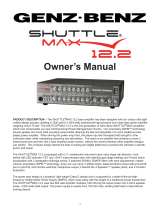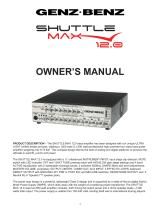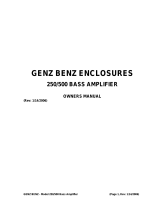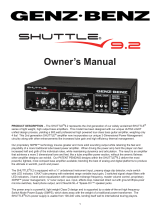Page is loading ...

OWNER’S MANUAL
♦ DUAL OUTPUT DESIGN ♦ 3-band EQ with parametric mids
♦ 200 watt Power Amp ♦ XLR Direct Out
♦ Active/Passive Input ♦ Internal “Soft Limit” Circuitry
♦ Shape Circuit w/ Low Boost, Mid Scoop & Signal Attack
(FRONT PANEL)
(REAR PANEL)
PRODUCT DESCRIPTION – The M-LINE-200 series has been designed with our unique DUAL
OUTPUT DESIGN, single channel, 200 watt bass guitar amplifier. It is equipped with ¼” unbalanced
instrument input, active/passive switch with LED indicator, variable input gain, 3 switched signal pre-
shape filters with LED indicators, 3 band active equalization with parametric midrange, master volume
control, ¼” tuner output, effects loop, balanced direct out with ground lift switch, and a dual mode 200
watt power amplifier with three 1/4” speaker jacks. Available models: ML 200-112T; ML 200-115T; ML
200-210T; and ML 200-HEAD.

INPUT – The ML-200 is equipped with a standard ¼” unbalanced input. Input sensitivity can be switched
from approximately 300 mV to 1.25 volt. The input impedance is 500k ohms. The precision input
scaling preamp contains a 36 Hz, 12 dB/octave high pass filter (more effective and less intrusive than
the more common 6 dB filters) and an “RFI” filter (radio frequency interference) to eliminate unwanted
noise. The input gain stage consists of a feedback type circuit that provides continuously variable gain
with minimal noise.
TUNER OUPUT – The ML-200 is equipped with a parallel and fully isolated tuner output. This jack is
located after the front end scaling preamplifier, is pre-signal shape and pre-eq and may also be used to
drive a separate direct box or high impedance recording device.
SIGNAL SHAPE – The ML-200 is equipped with 3 signal shape circuits that are factory programmed.
The LOW BOOST adds low frequency peaking gain in the 38-67 HZ band. This filter is especially
effective when used with a 5 string bass. The MID SCOOP switch generates midrange cut, the SIGNAL
ATTACK adds a peaking high frequency boost in the 2.25-8kHz band. LED indicators are provided to
visually show when each filter is engaged.
EFFECTS LOOP – The ML-200 is equipped with an effects loop, allowing commonly used “series” type
effects (such as compression/limiting units) or parallel effects (such as chorus or flange units that
contain an on-board “mix” control). The location of the effects loop is post signal shape and pre-
equalization. The signal is routed through the loop automatically if an effects unit is not plugged in. An
additional feature of the effects loop is that the effects send jack can be used as a post-signal shape,
pre-EQ line output. Plugging into the effects return jack will break the signal path and provides for a pre-
EQ line input.
ACTIVE EQUALIZATION – The ML-200 contains an active 3 band equalizer with sweepable
parametric midrange control. This equalizer, similar to those found on professional sound consoles, is
a very useful tool. The low frequency EQ section is an 80 Hz, shelving curve with 15dB of cut or boost.
The high frequency eq section is a 3.5 kHz, shelving curve with 15dB of cut or boost The parametric
sweepable-mid section features 12 dB of cut or boost with a bandwidth approximately 1 octave wide.
The center frequency of this filter is continuously user adjustable from 150 Hz to 2 kHz with a single
control. This filter is typically (but not always) used to reduce or remove offending frequencies in the
instrument’s pick-up response, or boosting response to achieve a particular voicing. Spend some time
experimenting so that the process becomes creative as well as corrective.
MASTER VOLUME – The master volume control adjusts the overall volume of the amplifier and the
effects return. Typically, best results are obtained when this control is operated between the 9:00 and
3:00 positions.
DIRECT OUTPUTS – The ML 200 is equipped with a high quality balanced direct output with ground
lift switch for pin 1. The output level is –10dB nominal line level, pin 2 hot, and the output impedance is
600 ohm. The direct output is fully protected from mixers providing phantom power up to 48 volts.
POWER AMPLIFIER – The ML 200 features our DUAL OUTPUT DESIGN which contains two separate
advanced monolithic power amplifier circuits that are fully protected against overloads, short circuits
and thermal faults. Output is rated at 100 watts per channel into 4 ohms (dual mode), and 200 watts
into 8 ohms (bridged mono mode) with excellent overload recovery characteristics. A unique feature of
this amplifier is the “on silicon” temperature sensor that automatically tracks and adjusts the amplifier’s
operating and protection parameters, a very cool feature that increases product reliability 10-fold over
conventional designs. With the Mode Switch in the dual position, only the dual speaker jacks are
active. With the Mode Switch in the bridged mono position only the bridged mono jack is active. Driving
speaker loads below the amplifiers rated minimum load (4 ohms each channel in dual mode and 8
ohms in the mono bridged mode) will result in distortion and possibly intermittent operation as the
protection circuits are activated.

POWER INPUT – The ML 200 is shipped from the factory with a standard IEC type power inlet
connector and the appropriate power cable for the market the amplifier was shipped to. The toroidal
power transformer is a universal input (115/230 volt, 50/60 Hz) with a voltage selector switch located
above the inlet connector. Be sure that this switch is in the correct position (matching your local power
system) BEFORE connecting the ML 200 to the power source. There is an AC mains fuse (with a
spare fuse included!) located in the small slide out tray on the IEC power inlet connector. Always
replace with the correct value fuse as indicated on the fuse chart located on the back of the amplifier.
CABINET DESIGN – The three combo models feature our unique M-Line shape that allows the combo
to be used in the upright position or laid back to the personal monitor position. USE CAUTION WHEN
SET IN THE UPRIGHT POSITION SO DIRECT PRESSSURE IS NOT APPLIED ON THE TOP-REAR
OF THE CABINET. THIS COULD CAUSE THE COMBO TO TIP BACKWARDS.
SPEAKER DESIGN – All combo models feature our tried and true high output woofers and conical
compression bullet tweeter. All three combos are configured to be 8 ohm impedance and these
combos come from the factory set to produce 200 watts from the ML DUAL OUTPUT DESIGN power
amp.
CAUTION!
• Never set an amplifier on anything that will tip over or collapse under its weight.
• These amplifiers are capable of producing sound pressure levels that may cause hearing loss.
• There are no user serviceable parts inside these units. Always consult a qualified repair facility for
service.
WARNING!
• The use and operation of this device constitutes an agreement of full release of any and all liability
connected with it’s use. Only persons familiar with the operation of high-powered audio equipment
should attempt to operate this device.
• In addition, by use of this device, the user agrees to hold Genz Benz Enclosures, Inc. and it’s
designers, sales agents and all other affiliates and related parties harmless in the event of any
accident, injury, damage or loss resulting from such use.
• Manufacturer’s sole responsibility is to provide a warranty on the specified performance of the
product under normal operating conditions for a period of 3 years.
WARRANTY:
• Genz Benz Enclosures, Inc. warrants the model ML 200 to be free from defects in materials and
workmanship for a period of 3 years from the date of purchase, when purchased from an authorized
Genz Benz dealer.
• This warranty does not cover normal wear and tear incurred from the normally designed use of the
product.
• This warranty is effective only if a copy of the original sales receipt is presented at the time of
warranty service
• This limited warranty is completely transferable to any subsequent buyer as long as the original
sales receipt is also transferred to such subsequent buyer.
• All warranty service must be performed by a Genz Benz authorized service center.
• Before returning any unit for service, a returned merchandise authorization number (RMA#) must be
obtained by calling 480-941-0705.

7811 E. Pierce Street, Scottsdale, AZ 85257 PH: 480-941-0705 FAX: 480-946-2412
/





